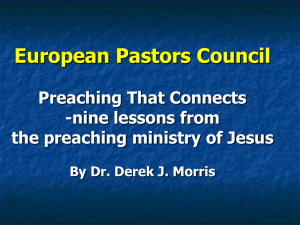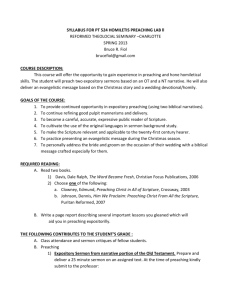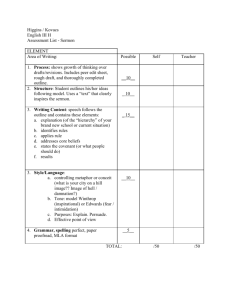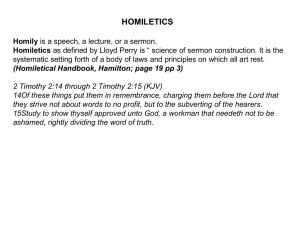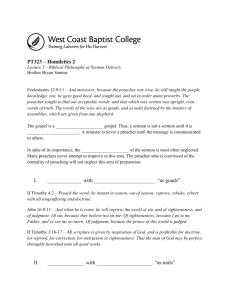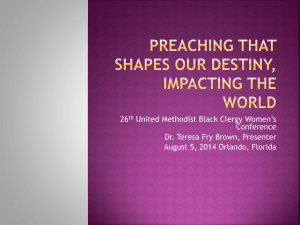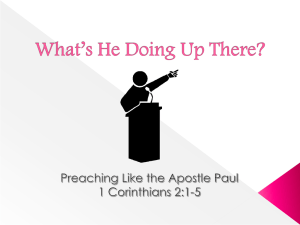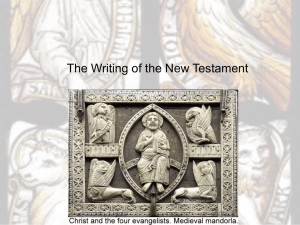IHM690G Creation-Crisis Preaching: Ecological Theology and
advertisement
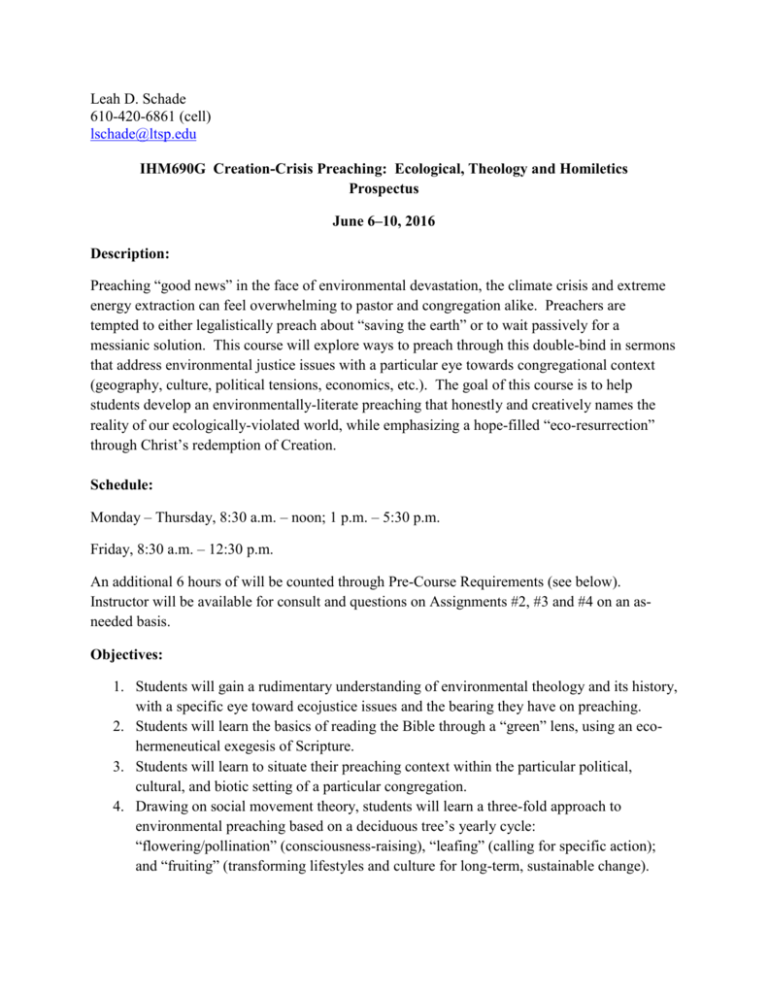
Leah D. Schade 610-420-6861 (cell) lschade@ltsp.edu IHM690G Creation-Crisis Preaching: Ecological, Theology and Homiletics Prospectus June 6–10, 2016 Description: Preaching “good news” in the face of environmental devastation, the climate crisis and extreme energy extraction can feel overwhelming to pastor and congregation alike. Preachers are tempted to either legalistically preach about “saving the earth” or to wait passively for a messianic solution. This course will explore ways to preach through this double-bind in sermons that address environmental justice issues with a particular eye towards congregational context (geography, culture, political tensions, economics, etc.). The goal of this course is to help students develop an environmentally-literate preaching that honestly and creatively names the reality of our ecologically-violated world, while emphasizing a hope-filled “eco-resurrection” through Christ’s redemption of Creation. Schedule: Monday – Thursday, 8:30 a.m. – noon; 1 p.m. – 5:30 p.m. Friday, 8:30 a.m. – 12:30 p.m. An additional 6 hours of will be counted through Pre-Course Requirements (see below). Instructor will be available for consult and questions on Assignments #2, #3 and #4 on an asneeded basis. Objectives: 1. Students will gain a rudimentary understanding of environmental theology and its history, with a specific eye toward ecojustice issues and the bearing they have on preaching. 2. Students will learn the basics of reading the Bible through a “green” lens, using an ecohermeneutical exegesis of Scripture. 3. Students will learn to situate their preaching context within the particular political, cultural, and biotic setting of a particular congregation. 4. Drawing on social movement theory, students will learn a three-fold approach to environmental preaching based on a deciduous tree’s yearly cycle: “flowering/pollination” (consciousness-raising), “leafing” (calling for specific action); and “fruiting” (transforming lifestyles and culture for long-term, sustainable change). 5. Preachers will learn how to interweave a prophetic and pastoral voice for the ecological crises of our time, while proclaiming God’s activity of redeeming, restoring, and resurrecting the Earth-kin community. 6. Students will apply and integrate their particular denomination’s resources for environmental theology in their sermons. 7. Students will preach one ecological sermon and receive feedback and constructive criticism from the instructor and classmates. 8. Students will write one ecological sermon and receive feedback and constructive criticism from the instructor. EXPECTATIONS: This is an elective course for students who have successfully completed a course equivalent to Introduction to Homiletics. The equivalent of 35-40 pages worth of written work is expected. PRE-COURSE REQUIREMENTS: 1. Readings from Creation-Crisis Preaching, Green Christianity, and Seasons of Creation (see Required Reading below). 2. Creating a “who-is-my-neighbor-map” of the ecological, social, cultural and political location of a particular congregation a. The question, “Who is my neighbor?” posed to Jesus by the lawyer in Luke 10:29 and the parable of “The Good Samaritan” that follows (Luke 10:30-37) compel us to survey our landscapes to expand the concept of “neighbor” to those of our Earth-kin and those entities that connect to each other in a biotic, social and spiritual way. b. Choose a church where you will preach at least one of the two sermons required for this course. Go to that place and walk the grounds around the building. Consider your surroundings, which include the land you are sitting or standing on, the plants near you, the air you are breathing, other living creatures perceptible to your senses, the buildings, businesses, factories, and other human-made “neighbors,” etc. Reflect on the interactions that are occurring between you and these multi-faceted surroundings. Are they harmful? Beneficial? Neutral? How do your natural surroundings affect your physical or spiritual existence? Your feelings? Your values? c. Look at a topographical map where the congregation is located. Notice the local waterways, landscape features (mountains, desert, beach, green spaces, etc.). Look at a map that shows the location of major businesses, industries, landfills, waste processing, etc. Do some research of the basic demographics of the area (census data, income data, sociological data). In what ways do the major “players” interact and have an impact on each other? d. Talk with members of the congregation to get a sense of “who” (in the expanded ecological sense) has been beaten and lies along side of the road. Who are “the least of these” (Matthew 25:40) in need of attention and care? e. Create a “map” of your findings. This can take the form of an actual map with key features noted, a hand-drawn representation, a collage of photos or images, a video, Powerpoint, or some other kind of visual display of the “neighbors” surrounding your congregation. You will explain your findings and your map in class. 3. One 500-700 word paper analyzing a sermon in one of the books for required reading. The means for analysis will include ecological hermeneutics, an environmental theological perspective, and the three-fold approach to environmental preaching. 4. One sermon, appr. 10 minutes in length. Either address an environmental issue of your choosing and use biblical passages of your choosing (see end of syllabus for list of suggestions on environmental issues). Or base your sermon on the lectionary readings from any upcoming Sunday (including the Revised Common Lectionary, Narrative Lectionary, African American Lectionary, or other lectionary as deemed appropriate by the instructor). Whichever option you choose for this sermon to be preached in class, you will do the other option for a written sermon due by the end of the course. Each sermon will draw on the ecohermeneutical, environmental theological, and eco-homiletical approaches studied in this course. Manuscript, outline or notes must be provided the day the sermon is preached in class. DURING THE COURSE: 5. One 700-1000 paper summarizing the ecotheological stance of your denomination through the critical examination and assessment of statements, articles, resolutions, or published resources. Drawing on these resources, the paper will draw implications for preaching about an environmental issue of one’s choosing (see list at the end of the syllabus). 6. One written sermon, appr. 10 minutes in length. See #4 above for description. All papers are to be double-sided, double-spaced with 1-inch margins in 12-point type and follow an established academic style. Footnotes and bibliography should be included and should list no less than five to six sources. Required Reading: The following texts are required to be read before class begins: Schade, Leah D., Creation-Crisis Preaching: Ecology, Theology and the Pulpit. Chalice, 2015. Wallace, Mark I. Green Christianity: Five Ways to a Sustainable Future. Minneapolis: Fortress. 2010, Chapters 1 - 4 Habel, Norman C., David M. Rhoads, H. Paul Santmire, editors, The Season of Creation: A Preaching Commentary (Minneapolis, MN: Fortress Press, 2011). Chapters 1 and 3. One sermon from one of the following (your choice) must also be read and analyzed (see #3 above): Rhoads, David, editor, Earth and Word (New York: Continuum, 2007). LeQuire, Stan L., editor, The Best Preaching on Earth: Sermons on Caring for Creation (Valley Forge, PA: Judson Press, 1996). Reading from these works will be made available online (these will be assigned either as required, recommended or supplemental reading): 1. White, Lynn Thompson, Jr. "The Historical Roots of Our Ecologic Crisis." Science 155, no. 3767 (March 10, 1967). 2. Habel, Norman C. Readings from the Perspective of Earth, The Earth Bible;. Cleveland, Sheffield: Pilgrim Press ; Sheffield Academic, 2000. (pages TBA) 3. McFague, Sallie. The Body of God : An Ecological Theology. Minneapolis: Fortress, 1993. (pages TBA) 4. Smith, Christine M., Weaving the Sermon : Preaching in a Feminist Perspective. 1st ed. Louisville, Ky.: Westminster/J. Knox Press, 1989. 5. McClure, John S., Other-Wise Preaching: A Postmodern Ethic for Homiletics. St. Louis, MI: Chalice Press, 2001. 6. Rose, Lucy Atkinson, Sharing the Word : Preaching in the Roundtable Church. 1st ed. Louisville, Ky.: Westminster John Knox Press, 1997. A bibliography to help direct your reading for papers and sermons is listed at the end of the syllabus. Bibliography Overviews of the Field of Religion and Ecology: Bauman, Whitney A., Richard R. Bohannon II, and Kevin J. O’Brien, eds. Grounding Religion: A Field Guide to the Study of Religion and Ecology. New York: Routledge, 2011. Grim, John, Russell Powell, Matthew T. Riley, Tara C. Trapani, and Mary Evelyn Tucker. “Religion and Ecology.” Oxford Bibliographies Online: Ecology. New York: Oxford University Press, August 27, 2013. http://www.oxfordbibliographies.com/view/document/obo9780199830060/obo-9780199830060-0103.xml Grim, John and Mary Evelyn Tucker. Ecology and Religion. Chicago: Island Press, 2014. Jenkins, Willis, and Christopher Key Chapple. “Religion and Environment.” Annual Review of Environmental Resources 36 (1 August 2011): 441–463. Taylor, Bron. “Introduction.” The Encyclopedia of Religion and Nature. 2 vols. Edited by Bron Taylor and Jeffrey Kaplan. New York: Continuum, 2008. http://www.religionandnature.com/ern/sample/Taylor--introduction.pdf Magazines and Journals YES! Magazine http://www.yesmagazine.org/ (good for ideas on how to preach the “good news” of positive change in society) Journal for the Study of Religion, Nature, and Culture. Brune, Michael. “All In.” Sierra. January/February 2014 Websites: Lutherans Restoring Creation. http://www.lutheransrestoringcreation.org/ Let All Creation Praise. http://www.letallcreationpraise.org/ The Forum on Religion and Ecology at Yale. http://fore.research.yale.edu/ Religion and Nature. http://www.religionandnature.com/ http://www.emergingearthcommunity.org Solutions Journal http://www.thesolutionsjournal.com/ FORE http://fore.research.yale.edu/ http://www.environmentalhealthnews.org/ Films: Swimme, Brian and Mary Evelyn Tucker. Journey of the Universe. Northcutt Productions, 2011. http://www.journeyoftheuniverse.org/ Ostrow, Marty and Terry Kay Rockefeller. Renewal: Stories from America’s ReligiousEnvironmental Movement. Fine Cut Productions, 2008. http://www.renewalproject.net/ Books: Berry, Thomas, Mary Evelyn Tucker, and John Grim. The Christian Future and the Fate of Earth. Maryknoll, N.Y.: Orbis Books, 2009. Boff, Leonardo. Cry of the Earth, Cry of the Poor. Maryknoll, N.Y.: Orbis Books, 1997. Deane-Drummond, Celia. Christ and Evolution : Wonder and Wisdom Theology and the Sciences. Minneapolis: Fortress Press, 2009. Gebara, Ivone. Longing for Running Water : Ecofeminism and Liberation. Minneapolis, MN: Fortress Press, 1999. Hessel, Dieter T., and Larry L. Rasmussen. Earth Habitat: Eco-Injustice and the Church's Response. Minneapolis, MN: Fortress Press, 2001. Kearns, Laurel, and Catherine Keller. Ecospirit: Religions and Philosophies for the Earth. 1st ed. New York: Fordham University Press, 2007. McFague, Sallie. The Body of God : An Ecological Theology. Minneapolis: Fortress Press, 1993. McFague, Sallie. A New Climate for Theology: God, the World, and Global Warming. Minneapolis, Minn.: Fortress Press, 2008. Rae, Eleanor. Women, the Earth, the Divine. Maryknoll, N.Y.: Orbis Books, 1994. Robb, Carol S. Wind, Sun, Soil, Spirit: Biblical Ethics and Climate Change. Minneapolis: Fortress Press, 2010. Santmire, Paul H. Nature Reborn: The Ecological and Cosmic Promise of Christian Theology. Minneapolis: Fortress Press, 2000. Santmire, H. Paul. Ritualizing Nature: Renewing Christian Liturgy in a Time of Crisis. Minneapolis: Fortress Press, 2008. Swedish, Margaret. Living Beyond the "End of the World" : A Spirituality of Hope. Maryknoll, N.Y.: Orbis Books, 2008. FICTION Kingsolver, Barbara. Flight Behavior Morrison, Toni. Beloved. Walker, Alice. The Color Purple. List of possible environmental issues to address in sermons (if you have different ideas, check with the instructor): Remember: there are both global and local takes on these topics. You may want to address one in a general way, but you’ll need to make it connect to your listeners and their context and experiences. By the same token, if you address a local issue, you will want to put it in the context of the “big picture” of ecojustice in general. And with any topic, think about biblical themes, concepts, stories, teachings, etc. that speak to or have application for the issue. Agriculture (monoculture) Fracking Air pollution/asthma Garbage (on land or in waterways) Animals/animal rights/animals for food Habitat disruption, elimination Brownfields Incinerators (medical waste, tires, municipal Chemicals waste, etc.) Clean energy Landfills Climate disruption Land/nature preserves Deforestation Methane gas Development (see Vandana Shiva’s concept of Mountaintop removal maldevelopment) Oil spills Eco-racism Pipelines Electricity production Sex-slave trade (women’s bodies/Earth’s body) Extinction Solar energy Extreme energy extraction Superfund sites Farming/agriculture/factory farms/fertilizer Sustainability Fishing, fish farms Waste production and disposal Food justice Wind power Fossil fuels (coal, oil, gas)
